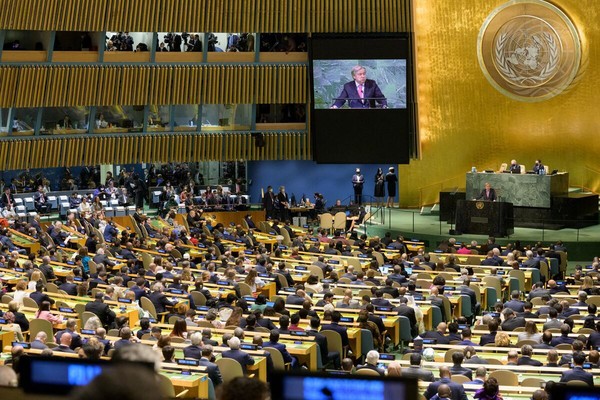The 77th session of the United Nations General Assembly (UNGA 77) opened on September 13, held in-person for the first time since the pandemic. The UNGA 77 got off to a tense start, with minor issues arising in following COVID-19 precautions, such as mask requirements. 157 delegates were scheduled to deliver speeches, with the exception of several figures of interest — President Volodymyr Zelensky of Ukraine addressed the UN via a pre-recorded video, while both President Vladimir Putin of Russia and President Xi Jinping of China missed the event. The UN Secretary-General António Guterres pointed out the war in Ukraine, the climate, and the economy as key topics of concern, warning of “a winter of global discontent”.

Though not stated during the General Assembly, the most significant address was Putin’s, with him claiming that the West aims to destroy Russia while reaffirming his position of “liberat[ing] Donbas”. In line with his stance, Putin signed an Executive Order on September 21 for the partial mobilization of Russian citizens starting on the same day, which also included clauses on the increased production of weapons and military equipment. Putin underscored that Russia possesses “different types of weapons”, which many delegates interpreted as nuclear weapons. During the General Assembly, many speakers condemned the actions of Russia, including President Biden, who denounced Russia for “shamelessly violat[ing] the core tenets of the United Nations charter” and making “irresponsible nuclear threats”. Zelensky’s address, played on September 21, was similarly direct, calling for “just punishment” and the withdrawal of Russia’s veto power in the Security Council. Measures proposed by Zelensky against Russia include price caps on Russian oil and continuing the existing sanctions amidst rising energy prices. As such, the war remained a central topic for many speeches. However, it is unlikely that the UN will have much power to intervene, as seen in the Security Council meeting held on September 22 — while the discussion was similarly heated, the discussion ended without any rulings as both Russia and the US have veto power; no conclusion would arise on topics in which they oppose each other. This April, new hurdles were introduced to the vetoing procedure to prevent the abuse of veto power, calling for a special report by the Council on any usage, along with a debate in the Assembly. Whether this will affect future Council action on the war in Ukraine remains to be seen.
Climate change was also highlighted as an urgent issue, as demonstrated by the numerous climate-related natural disasters this year. Many brought up the divide between the prime polluters and the affected countries, including Pakistan’s prime minister, Muhammad Shehbaz Sharif. Describing the recent floods in Pakistan as “biblical”, Sharif expressed his gratitude to countries that have sent aid, and pleaded for continued assistance “when the cameras would have gone”. Bringing up the need for collaborative effort in mitigating climate change, President Yoon Suk-Yeol pledged to ramp up Korea’s Official Development Assistance funds to help developing countries reach a low-carbon future, while sharing related technologies. Meanwhile, an informal Roundtable on Climate Action was held in preparation for the 2022 United Nations Climate Change Conference, with attendees detailing their plans for reaching climate goals and stressing the need to reform the climate finance of developing countries to simplify the process while fulfilling their 100 billion USD goal.
By resuming in-person gatherings, the UN General Assembly revived its position as a hub for both formal and informal diplomacy. However, it had its limitations. Different nations had different priorities, and the spotlight on Ukraine may have left other issues neglected, including the Iranian protests or the 27 conflicts currently underway worldwide according to the Council on Foreign Relations’ Global Conflict Tracker. The wider impact the war in Ukraine has had, including food shortages and rising living costs, admittedly shows the urgency of the issue even for less-involved countries. However, the non-binding resolution to emerge from this year’s General Assembly is unlikely to have much impact on even the central issue, Ukraine, just like the unheeded resolution adopted in March which called for the withdrawal of Russian troops. Nevertheless, the UN drew the attention of world leaders towards the world’s most pressing issues, to at least introduce, if not implement, feasible solutions.

